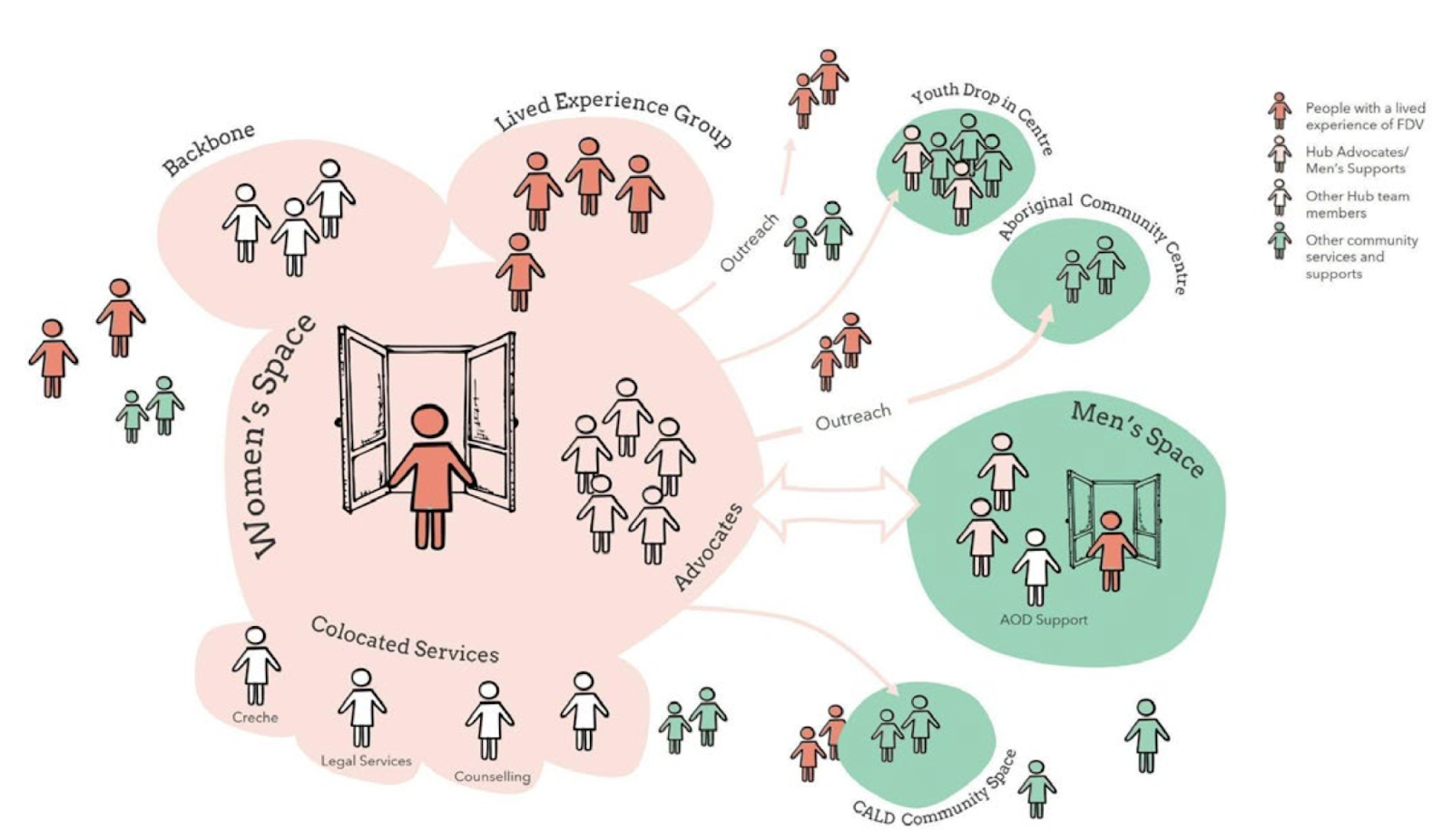Re-establishing safety, rebuilding connections in Armadale
Designing an FDV Hub
With Western Australian Minister for the Prevention of Family and Domestic Violence, Armadale
In 2021, the Western Australian Minister for the Prevention of Family and Domestic Violence (FDV) announced plans to open a new ‘One Stop Hub’ for FDV support for the Armadale area of WA. The One Stop Hubs model provides for primary prevention, early intervention and post-crisis intervention, filling gaps left by a focus on crisis response in other parts of the system.
The State Government will spend $14.7 million to deliver on its election commitment to establish and run the Armadale Family and Domestic Violence Hub. It has commissioned Innovation Unit to facilitate and support an engagement process to ensure the model was driven by the perspectives, priorities and aspirations of local people, including those with lived experience of FDV. Foundational to this approach was Innovation Unit’s Model for Scale, an evidence based, collaborative and user-centred method for adapting service models from one place to another.
The challenge
The current system is in crisis. It does not protect the vulnerable including women and children and is not reducing the crime and cycle of family violenceWestern Australian Premier Mark McGowan
Women and their children often find themselves in situations of homelessness when exiting an abusive relationship. As a result, family and domestic violence is the leading cause of homelessness for women and children in Australia. Some approaches for supporting women and children from leaving abusive relationships can be unhelpful and occasionally re-traumatising, as victims navigate a complex and uncoordinated web of agencies, services and experiences to find what they need. The One Stop Hubs model aims to shift the existing paradigm of support by focusing on prevention of FDV, early intervention and post-crisis intervention; and has been successfully implemented in Mirrabooka and Kalgoorlie in 2020.
Adaptation is vital to the successful implementation of any existing model. What worked in Mirrabooka and Kalgoorlie, and what was important for local communities in those areas, may not be the same as Armadale. The Department of Communities and the Armadale community identified a number of clear goals for the engagement process in order to develop a locally-responsive approach:
- That the model meets a genuine need in the Armadale district, and therefore has the best potential for achieving outcomes.
- That there is local ownership of the FDV Hub, establishing a strong foundation for ongoing operations.
- That proposals are uncovered for several practical service design components including target groups, potential location and service offering.
The process involved engaging with the team from Naala Djookan, the Mirrabooka FDV Hub, to understand the existing model and the learnings gained since operation.
That knowledge then allowed for a nuanced conversation with the Armadale community, Elders and service providers to adapt the model to the Armadale context. Approaches used to understand the local environment and develop a hub approach included service mapping, community surveys, interviews with a broad range of stakeholders, consultation with Elders, persona and user journey development and service walkthroughs to demonstrate the features of the model as it evolved and seek feedback from participants on its suitability and potential for impact.
Throughout engagement activities, we sought to understand what about the One Stop Hubs model needed to be fixed in place in Armadale to have a meaningful impact on those seeking support and on the prevention of FDV in the community; and what features of the model must be responsive to the experiences, needs and goals of those it is being designed to serve.
Our impact
The service model that emerged for the Armadale FDV Hub consists of a main space for women experiencing FDV, that acts as a focal point for the service, with a smaller off-site operation for male perpetrators or potential perpetrators, in a separate location, likely based within an existing men’s service or space. In order to facilitate access to the FDV Hub by those who would find a centralised service delivery difficult, these two spaces are supported by outreach activities into existing community spaces. This includes the provision of a specific youth service delivery to allow the FDV Hub to intervene early, before problematic behaviours are cemented.
The high-level model intentionally leaves a range of decisions in the hands of the service provider/s who will eventually take on the operations of the Hub, however, it surfaces the service principles that emerged from the Armadale community, service providers and existing evidence base in order to build a strong foundation and support the success of the recommended Hub components.
You can find out more about the model including how it was developed and what it looks like in practice in the Armadale One Stop Hub Service Model Proposal. To keep informed about previous and future engagement opportunities for the development of new Hubs, please visit the WA Government’s One Stop Hubs page.

Project team
Jethro Sercombe
Director Innovation Practice (Australia New Zealand)
Kaci Oliphant
Project Officer (Australia New Zealand)